
After much reticence on my part, I took some time out of my day to watch the first three episodes of Amazon’s The Rings of Power season 1. Sadly, it was as I feared in some aspects and impressive in others. However, the good doesn’t outweigh the bad. In fact, there are a lot of things wrong with this show. Which is why Amazon’s The Lord of the Rings: The Rings of Power is going to be an expensive lesson in bad writing.
When it comes to adaptations of classic literature, video games, and even modern novels the failure-to-success ratio of such undertakings is not promising. For every Peter Jackson’s The Lord of the Rings is a trove of poor adaptations such as The Wheel of Time, The Witcher Season 2, Cinderella (2021), The Dark Tower, A Series of Unfortunate Events, The Golden Compass, The Time Machine (2002), and The Book Thief to name some. Obviously, there are so many more but the more recent examples I can name are based on books that aren’t even good in my opinion. Some examples would include Twilight, The Hunger Games, Eragon, The Mortal Instruments: City of Bones, and the Divergent Series.
Why this tends to be a recurring issue is a discussion best left for another day or blog post of its own since I would rather focus on Rings of Power.

Yet, before I start to talk about what I found wrong about the show I should talk about what I liked about it. The biggest thing is the visuals. They are rather outstanding and, for the amount of money poured into this series, I would have been shocked if the visuals hadn’t reflected that budget. Just seeing the Two Trees of Valinor reminded me of how much I dearly want to see a series based on The Silmarillion which has so many epic stories and engrossing history.
In addition, a lot of the set pieces are also excellent. I especially enjoyed what we are seeing of Khazad-dûm, though it is not enough for me (I want to see more). Which brings me to the Dwarves. I am enjoying the scenes involving Durin and Disa. In fact, they are my favorite part of the show bringing some levity to the somber tone that has been established.
One other thing I am enjoying with the show is the music. The Lords of the Rings trilogy composer Howard Shore composed the opening theme for The Rings of Power with Bear McCreary in charge of writing the score for the Amazon series. The score has been enjoyable to listen to in the background as the show’s plot unfolds.
Of course, I am a sucker for orchestral soundtracks.
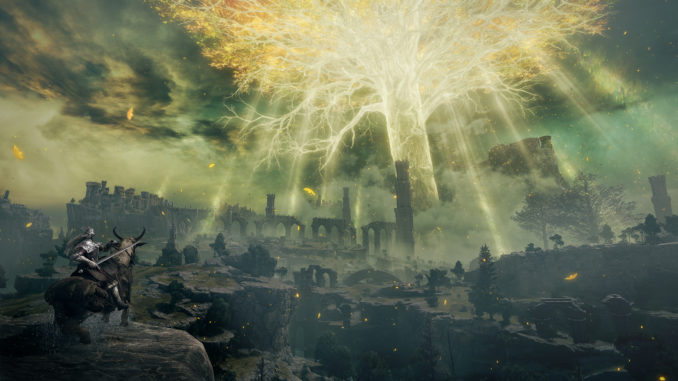
Unfortunately, those are all of the positive things I can say about the show. Which is not a lot. Especially when you think of all the money that was poured into this project. Now, I don’t like having to criticize anything. It isn’t a fun thing to do. But neither should people stay silent when something isn’t good. Moreso when it is being applauded by so-called critics and mainstream media.
Which makes it incumbent upon fans to speak out when usurpers try to flaunt what they are creating as superior to the LOTR movies or anything else in general. When they have the audacity to proclaim, “We’re telling the story now,” how is anyone not supposed to fire back? Especially when these “creators” double down by attacking and demonizing fans who are providing legitimate criticism of what they are doing to the world of Tolkien by calling them racists.
Whether a fan or not, the majority of people want the writing to be faithful to the world created and not to inject modern politics and modern views. Even when it comes to movies that are historical fiction. Audiences don’t want the history to be glossed over to push a certain narrative. It’s why so much criticism has been leveled at a show that decided it didn’t want to tell any of the awesome stories from Tolkien’s world but to make its own story. So surely the writing would be up to the challenge and reach the high bar that the cast and crew have espoused ad nauseum as the show’s release loomed nearer?
But, after seeing the first three episodes, the writing falls way below expectations.
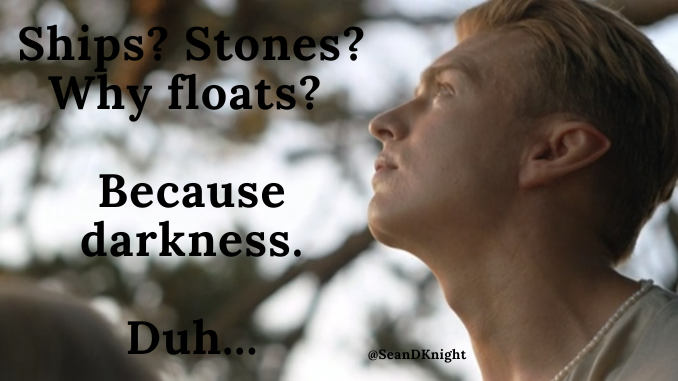
The overall feeling of the show’s writing can be described as ponderous and pretentious with a sense of desperation. Observe its attempt to recreate the epic opening that conveyed the gravitas of The Lord of the Rings trilogy and you will see that The Rings of Power failed, at least for me, to convey any of that. Most especially when there is a discussion between Galadriel and her brother where he asks, “Do you know why a ship floats and a stone does not?” It’s an odd question to ask but his answer was also baffling,
“Because the stone only sees downward. The darkness of the waters are vast. Irresistible. The ship feels the darkness as well. Striving moment by moment to master her. Pull her under. But the ship has a secret. For unlike the stone, her gaze is not downward but up. Fixed upon the light that guides her. Whispering of grander things than darkness ever knew.”
Her brother’s answer was out of left field and made no sense whatsoever for the analogy he was attempting to provide. To put it bluntly, it comes off as pretentious drivel trying to hide within a poorly crafted analogy or metaphor. And this is just the opening scene for the entire series! Yet, similar scenes played out in these two episodes where something was supposed to be serious, deep, or meaningful and would fall flat. Either because of the dialogue that was written or even the delivery.
In fact, many of the scenes trying to set up this show’s version of Galadriel fell flat due to bad writing or lackluster delivery. It is jarring to see how the writers have taken a strong, likable character and turned her into a boring piece of emotionless cardboard. There is so much wrong with what was done with Galadriel that it will require its own article to fully explain the issues with the Rings of Power version.
But the show’s opening lays the groundwork for the show which is exceptionally important. After all, authors know that the first page of their story is a critical part in becoming a successful writer. It establishes the tone, sets up expectations, and introduces the reader to the narrative voice. Sadly, The Rings of Power’s opening scenes set up a tone that is languorous, lackluster, pretentious, and light on the details.
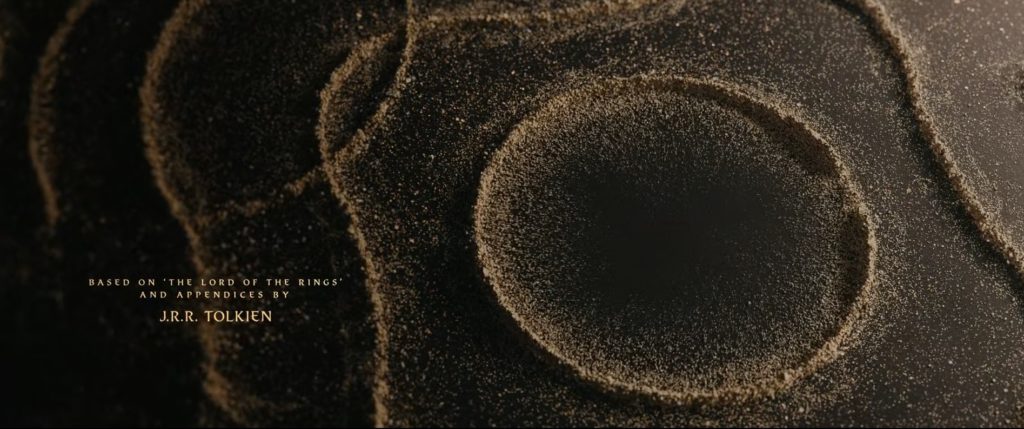
But, returning to the character who provided this answer to Galadriel, it is her brother, who is never named in these two episodes, that is the driving force behind this show’s Galadriel. Yet, it showcases another issue with the series that I have. Amazon doesn’t have the rights to The Silmarillion, The Book of Lost Tales, or anything about Middle-earth that isn’t mentioned in the Lord of the Rings trilogy (which is surprisingly acknowledged in the show’s own title screen). Nor is her brother the only character not mentioned by name, in the first two episodes, as you also have the High King (Gil-galad – he was finally named in episode 3).
Why their names are never mentioned might be due to Amazon not having the rights to Tolkien’s other works (though both names appear in the trilogy if only as throwaway background/worldbuilding information). Which is a really bad thing as it hinders the fleshing out of the story and worldbuilding trying to be accomplished. Two major factors that are attributed to Tolkien himself and why his books are so popular.
It’s not just the show’s inability to name important characters but also the glossing over of their importance. Galadriel’s brother, who is named Finrod Felagund, was an epic and prominent character in Middle-earth history (which isn’t mentioned in the trilogy). Even how he died is glossed over since it was due to Beren, the same man who fell in love with an Elf named Luthien, that led to his death. In fact, Sauron didn’t directly kill Finrod at all. Sauron sent a werewolf to kill Beren who was imprisoned alongside Finrod. But before the werewolf could kill Beren, Finrod broke his chains, slew the werewolf barehanded, and died as a result of fulfilling his oath to Beren’s father.
But will general audiences hear about this? Will we get to see such an epic tale or conclusion to an awesome character? I highly doubt it since the story has now been retconned by Amazon’s The Rings of Power according to Galadriel who says,
“Sauron killed him and marked him…”
Say what? That’s not what happened! In fact, that is more boring than what really happened…

However, speaking of glossing over things, retconning history, and ignoring Tolkien’s worldbuilding, let’s address the black Elf in the room. Oh yeah, I’m going to hit this topic faster than Arondir hitting on Bronwyn (because you know he obviously wants to tap that). Seeing a black Elf in Middle-earth is jarring for fans, like myself, who know the lore and history of the Elves.
Humans? Of course. Dwarves? Definitely. Hobbits? Don’t care.
But Elves? Nope, not possible.
There is almost nothing in the history of the Elves that would give rise to a natural, dark-skinned Elf. They came into the world when there were only stars in the sky. There was no sun or moon at the start of their existence. Even when there was a day and night cycle, the Elves have always lived in temperate climates and in forests.
The argument that faux Tolkien fans and the ignorant social justice critics like to repeat over and over is that this is a FANTASY world and a FANTASY story. Well, even within fantasy there are still certain realistic elements that should be, or are, followed. After all there tends to be constants such as water flows downwards to larger bodies of water, the laws of gravity, concepts of time, and biology. Are there exceptions to these things? Certainly! Magic is used as a crutch or explanation for geographical anomalies, discrepancies, and so forth. But there are not many such explanations in Middle-earth.
So in Tolkien’s world, there is almost nothing to support the existence of a dark-skinned Elf.
Now, is it impossible for there to be a dark-skinned Elf to exist in Tolkien’s world? Certainly not. It just requires an Elf to have a child with a dark-skinned Human, Dwarf, or Hobbit or for a faction of Elves to live in a more desert-like environment or areas where they would be completely exposed to the sun for long durations.
So for all of you people out there who don’t know anything about Tolkien’s world, Elvish history, or how biology works. I don’t expect you to understand any of this.
But keep trying to paint Tolkien fans as racists.

Nevertheless, because procreation is not the case here since there are, in all of the history of Middle-earth, only three instances where an Elf procreated outside of their race with other mortal races. Not to mention that none of the Elves would naturally have dark skin, Arondir’s existence makes no sense within the lore, since all three examples of Elven relationships were with Humans. To be more accurate, at the time of Arondir’s existence only two of those relationships took place, which the show acknowledges as it introduces this relationship in a hamfisted way.
But despite that acknowledgement, and the foreknowledge that only one other coupling took place during the Third Age, it appears the show’s writers wanted to add its own little Elf-Human romance. Why? Probably because they want to” tell their own story” and disregard the history that Tolkien crafted.
Yet, in trying to tell “their own story” the writers are still just copying certain elements that Tolkien created in his masterful telling of the stories of Middle-earth. The Rings of Power wants to tell their own Human Elf love story that, I’m sure in the writers’ minds, will rival what Tolkien provided. They are also trying to recreate the Frodo and Sam dynamic with the two Hobbit girls.
But this is not creating anything new. They are just repackaging the old and adding a shiny wrapping to it in the hopes no one notices that, underneath the outer layer, there is nothing of substance below the surface.
As for the romance between Arondir and Bronwyn I really don’t care because it is not canon and there is nothing compelling about either of these characters as I have seen of them. Especially when Bronwyn decided to just leave her son, Theo, alone to go with Arondir to find out what happened to another human village.
What the Rings of Power showrunners are trying to do is what Peter Jackson did in The Hobbit trilogies when he tried to include a romance between an Elf (Tauriel) and Dwarf (Kili). However, I am not sure if this was a plot created by Guillermo Del Toro and Jackson had to go with it when taking over the production of the films. But it is one of the few criticisms I have for the LOTR director when it comes to The Hobbit trilogy.
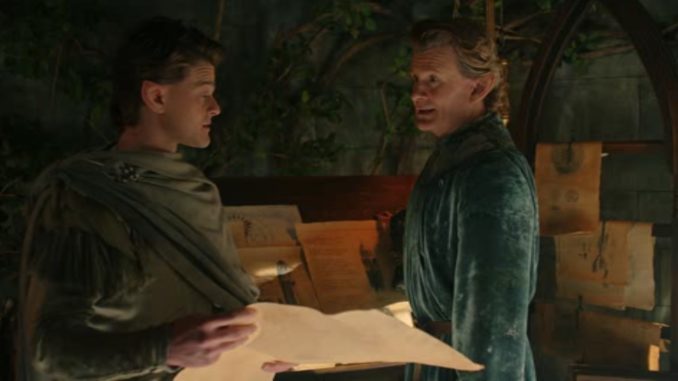
Of course, how can I talk about Elves and not criticize the casting of the Elves in The Rings of Power? Let’s be honest here, the majority of these actors don’t even look like the Elves that Tolkien described in his works. Elrond, Celebrimbor, and even Gil-galad – none of them have an Elven look about them. In fact, with the first two, they look as if they should have been cast as Hobbits rather than Elves.
In spite of this, I guess it isn’t fair to bash The Rings of Power for its casting choices. After all, Peter Jackson set the bar too high for others to follow. How dare he take the time to cast actors that had specific features that made them look like Tolkien’s Elves. How dare he try to be as true to Tolkien’s works as he could make it.
However, you would think that a show, where the Elves are so prominent in this age, could have done a better job at casting for this race. I mean, for $1 billion you would think that, right?
Instead, we got an Elven cast that had me wondering an important question.
Where are all my Elven homies at?

Another issue I have, when it comes to the Elves and their history, is the relationship between Elrond and Galadriel. When they first met in the show, they seemed overly affectionate which creeped me out. Why? Well, Tolkien fans will know that Elrond marries Galadriel’s daughter Celebrian.
So to see Elrond be so affectionate and fond of his future mother-in-law is jarring for me. And I know there are going to be the general audience losers who will try and ship these two characters together (write stories or discuss that these two are in a relationship).
These people, known as shippers, are some of the worst when it comes to, not just fandoms, but the faux fandoms. From trying to ship Obi-Wan Kenobi and child Leia, to threatening actors and writers it is truly insane. It’s one thing to be disappointed when Harry Potter ends up with Ginny Weasley instead of Hermione Granger, but to get so out of whack and to act so irrationally is something else entirely.
I just hope that the writers behind The Rings of Power refrain from even hinting at some kind of relationship between Elrond and Galadriel and, though it is too early to tell, there could be a kiss between the two at some point.

But enough about the Elves. Let’s talk about another pointy-eared race that is being pushed to the forefront in an age where they weren’t even a footnote in the doings of Middle-earth. The Harfoots, aka Hobbits.
I’ll be blunt, I really don’t care for them or about them. I don’t care about budget Frodo (Nori Brandyfoot) and Sam (Poppy Proudfellow) that, once again, the creatives behind this show decided to try and copy another thing from The Lord of the Rings with this dynamic. And it isn’t working. Not by a long shot for me. Not only these two characters but the Harfoots in general.
Put simply, the Harfoot culture is both boring and disturbing. It is a community that does not operate like a community. When Nori’s father, Largo, breaks his foot there is no discussion on how to help the Brandyfoot’s keep up with the caravan. The group doesn’t come together to help one of their own. It’s about the collective as a whole and not the individuals. The strong and able-bodied and not the weak and disabled; a philosophy more in line with “survival of the fittest” with a large dose of Communism. A more modern ideology in today’s political circus to be more direct. Especially as they recite,
“Nobody goes off trail and nobody walks alone.”
Which makes the Harfoots a repulsive thing to watch. Especially when you think about the scene where they take time to remember those who have “fallen behind.” My revulsion is further amplified when the leader Sadoc Burrows says, “In life, we could not wait for them…
It is horrific to think that all the names they have recited are people and families who they might have abandoned rather than help. Which is repugnant to consider when you think how close-knit communities were in older times in the real world. What nomadic tribe, group of settlers, or early civilization would have been able to survive or do anything if they were like the Harfoots?
So rather than get help from the rest of this tribe – what kind of evil person do you have to be to suggest you take their wheels – Nori and her family are left at the back of the train to fend for themselves. Granted, they are thrown to the back because of Nori’s actions and as a “compromise” to her being de-caravanned. But why not just put her at the back rather than pronounce an almost-certain death sentence on the entire family? Hell, where is the community spirit where other families would help the Brandyfoots to keep up?
But not all is lost, dear friends.
For they have Meteor Man to help them!
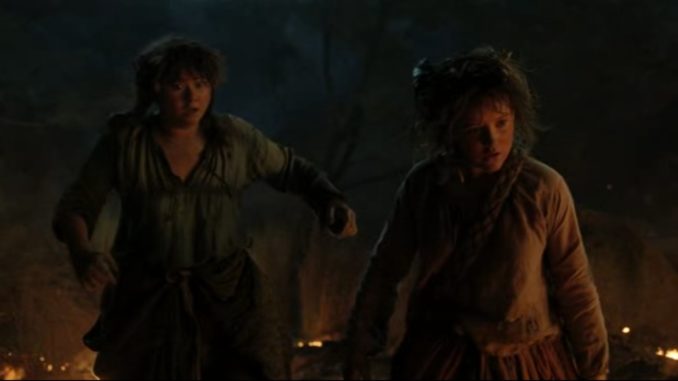
Gandalf, one of the wizards, or Sauron himself, it doesn’t matter. The identity of Meteor Man is another part of the Rings of Power that I do not care about or am vested in. The quasi-Gandalf-but-not-Gandalf character who arrived via meteor express continues to provide further proof of the horrendous writing that is behind this show.
With the introduction of this character, someone thought it was a great idea for Meteor Man to mimic the LOTR movies when it comes to Gandalf. From growing in size to be more menacing to speaking with insects and even wearing a tattered gray cloak, The Rings of Power directly copies these things in order to make the audience think it is Gandalf.
If it is Gandalf, then the writers are ignoring the history of how Saruman, Gandalf, Radagast, and the two blue wizards arrived on Middle-earth. To be succinct, they arrived in Middle-earth on a ship that landed at the Grey Havens, in the Third Age and not the Second Age, where Cirdan the Shipwright saw Gandalf and gave the wizard Narya, one of the three Elven rings. If it’s not Gandalf, but one of the other wizards, the same issues will still apply.
Should it be Sauron, which is a possibility since the show establishes that fire giving off no heat is an indicator of something being either evil or Sauron’s presence or influence, it still doesn’t matter. During the Second Age, Sauron had been around for a long time and, after the fall of his master Morgoth, went into hiding. So him reappearing in such a fashion is both odd and doesn’t make any sense.
Suffice to say, Meteor Man feels more like a vehicle to include Hobbits in this show in the hopes of just attracting the general audience who watched the movies.

Which brings up other characters such as Theo (Arondir’s alleged love child) and Halbrand (an alleged wannabe corrupt Aragorn and most likely Sauron) who, I’m sure, are both supposed to be important or have pivotal roles in the story. Even so, Halbrand feels like a half-hearted attempt to recreate an Aragorn-like character while Theo acts like an emo goth kid. But, once more, I don’t really care for either one. Whether they are future servants of Sauron or Sauron himself it is hard to care one way or the other.
They don’t feel well-written, or well-developed, and there is nothing really interesting about them. Yet the writers appear to go out of their way to make the audience come to certain conclusions in a ham-fisted attempt at a pseudo-mystery. Such as Theo hiding his ears behind that long hair, who might be Sauron, that Meteor Man might be Gandalf, that this Galadriel is supposed to be THE Galadriel, and so on and so on.
There are plenty of other issues I could bring up, such as discontinuities or tone-deaf scenes in the show written for the sake of having a “cool” or “dramatic” or “funny” moment. One such example involves Arondir who, with Bronwyn, goes to the village to see that everyone is missing and discovers a hole in the ground. Arondir tosses the torch down to see how deep it is, Bronwyn hands him her lantern, he jumps down into the hole with it in his hand, but the next shot is him holding the torch and waving it around when he should have the lantern in his hand.
Then there was the scene in Episode 2 where Galadriel meets Miriel. Galadriel and Halbrand are escorted into the room where Miriel and the court is waiting for them and they both start to bow with Miriel stopping them by sayin, “No one kneels in Numenor.” It is supposed to be a funny moment that directly rips off a similar scene in Black Panther where T’Challa says, “We don’t do that here.” While the scene works for the Black Panther movie, it doesn’t work for The Rings of Power. First, they do bow in Numenor and continue that all the way to Aragorn when he is crowned king. Of course, we must gloss over the fact that the show’s version of Miriel looks nothing like how the books describe her as “fairer than silver or ivory or pearls” though, to say that, would be seen as racist by the show’s fans. But this is just another example of how tone-deaf and talentless the writers are that they would steal this scene and inject it into a setting that it doesn’t fit just for a cheap laugh and to be “woke” and “modern.”
Oh, and how stupid do you have to be to jump off a ship that is hundreds of miles from land? What were the writers thinking? They could have written that Galadriel arrived at the Undying Lands and the Valar allowed her to return to Middle-earth since they would not forcefully keep her there (though, it is out of character to have here even think of accepting to return to the Valar when she wanted to establish her own kingdom on Middle-earth during this time). I mean, you’ve already retconned the character, at least this way the writers might have been able to create a cool or interesting moment where she interacts with the Valar.
But you know, the writers probably thought it would be cool and badass for her to jump off the ship before reaching paradise. That, and having her remember what her unnamed brother whispered in her ear when he was babbling about stones and ships.
Unfortunately, it is just another misstep in a series of missteps that continue coming one after the other.
Disappointment after disappointment.

When it comes to being an author, there are several constants in order to draw the reader’s attention to your work and then retaining that attention. A good cover, good title, and an engrossing first page. Combined, they increase the chances of attracting the reader long enough to give the writing a chance to retain them.
The writers behind the Rings of Power seemed to have forgotten what makes a great story and especially what makes great television. It’s bad enough that they wanted to create their own story within someone else’s work. Bad enough they talked a big game only to fail in the delivery when it comes to the story and even the dialogue. It is even worse when they recycle great lines from the books and insert them into their show to try and drum up reactions from the fan. Then they, and Amazon, show how pathetic they are by calling people racists who are providing genuine criticism of a failing project (this narrative pushed by shill corporate media such as NPR, USA Today, Reuters, Screenrant, NBC News, and many others).
Amazon knows it has a failure and a big flop on its hands. Why else would Amazon, which owns IMDB, manipulate the review scores to make the show appear to be liked and well-received. That Amazon wouldn’t allow reviews to be posted for the first three days after the show aired. It’s exceptionally bad that the Tolkien fans they are calling racist are the same ones who are enjoying HBO’s House of the Dragon which is crushing Rings of Power. That as the ratings are starting to show, are turning out to be pretty bad.
So to the cast and crew of Amazon’s The Rings of Power, I would like to tell you that Tolkien fans are not racist. You are just retarded and lacking in talent. That is why Amazon’s The Lord of the Rings: The Rings of Power will be remembered as an expensive lesson in bad writing.
If not the most expensive in entertainment history. With $1 billion you would have thought that Amazon could have afforded, at the very least, some good writers.
Author’s Note: Support this site by donating via Paypal or even checking out our merchandise on RedBubble where you can find designs that cater to writers and readers. Money donated and raised goes into paying for this website and equipment.







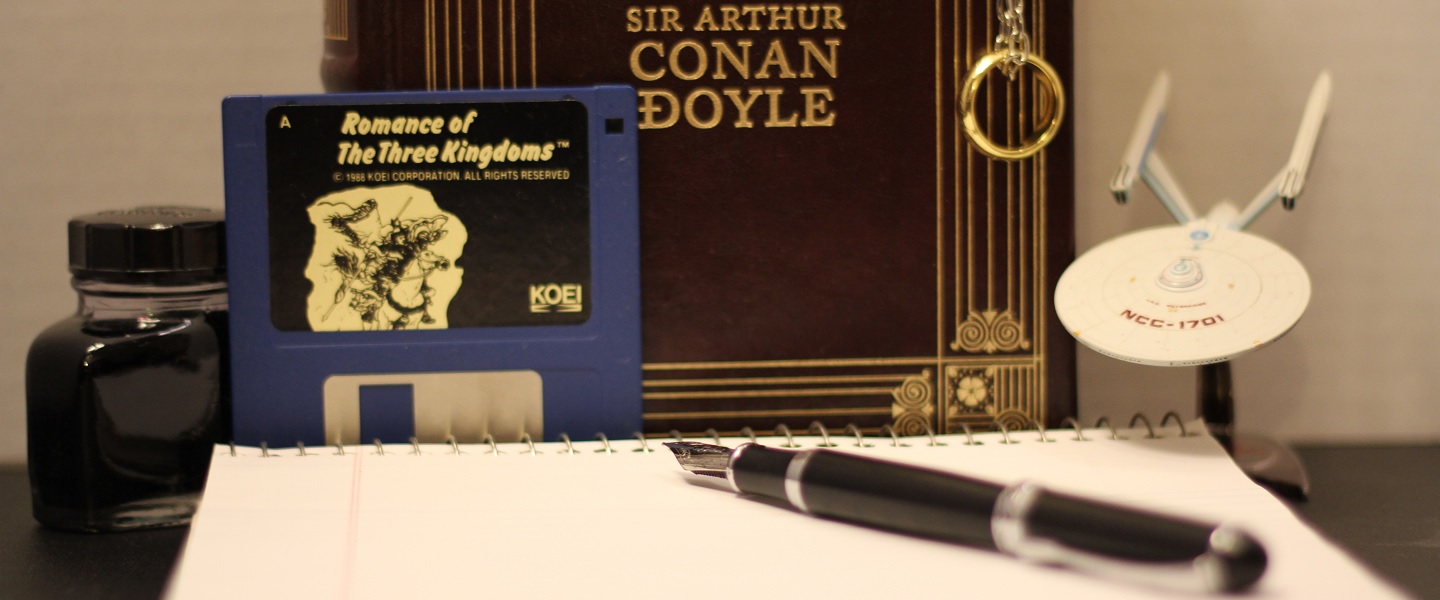
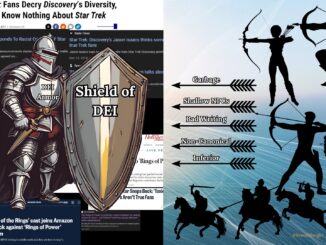
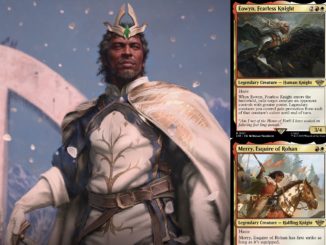

[…] contributing factor for its poor reception and why Tolkien fans are upset about The Rings of Power. Bad writing is what led to the show’s slow pacing, unwillingness and inability to adhere to canon, changing […]
[…] Sauron is recruiting allies and servants from the Easterlings or the Haradrim. However, I would be overestimating the Rings of Power writers’ writing skills and intelligence if I actually thought they had considered […]
[…] course, The Rings of Power’s horrible writing has led the show into a seemingly-directionless plot with too much going on for both Tolkien fans […]
[…] that equals Peter Jackson’s level of respect for J.R.R. Tolkien’s The Lord of the Rings while Amazon’s The Lord of the Rings: The Rings of Power is an example of the exact […]
[…] with their adaptations. Unfortunately, that hasn’t been the case as Tolkien fans witnessed with Amazon’s The Lord of the Rings: The Rings of Power. In fact, respect to the source material has never been shown by works released since Jackson’s […]
[…] are a lot of reasons for not liking Amazon’s The Rings of Power. From its mediocre writing, to ignoring or retconning established lore, the pathetic attempt of worldbuilding, its […]
[…] Gimli and Aragorn. While The Rings of Power attempted similar fan service, such as the horrific Harfoots to shoehorn hobbits into the Second Age, such attempts are understandably constrained by its place in the timeline. […]
[…] viewership for season 2 is to be expected for any show, the percentages are not very promising for Amazon’s expensive adaptation of J.R.R. Tolkien’s Middle-earth, though not too surprising given the lackluster response to The Rings of Power promotions leading […]
[…] fans over the show’s narrative choices, pacing, completely changing established characters, writing, and injection of modern-day sensibilities and ideals. Such alienation from the Tolkien fandom […]
[…] Not just as an adaptation of Tolkien’s beloved world, but as a fantasy series in general. The writing is sloppy, inconsistent, and pathetically pretentious. The characters lack personality, charisma, proper backstory or buildup, and, in some cases, are […]
[…] approach. Which, as readers will know, I am not a fan of the show. Not by a long shot for its bad writing and disregard and disrespect for Tolkien’s Middle-earth, the lore, and the author’s world […]
[…] 2 finale has finally aired and, as always with each new episode shown, continues to shine as a beacon of what bad writing can accomplish. While the Season 2 finale had some cool visuals, the problem is that just because something looks […]
[…] centered around them. However, The Rings of Power is plagued with a plethora of issues. From its poor writing, to miscasting of characters, to ignoring J.R.R. Tolkien’s canon, and more, one would think that […]
[…] of Tolkien as the company sought to hide behind the DEI shield as it produced The Rings of Power. A show that is so badly written that it completely ignores canon, disrespects Tolkien, fails to capture Tolkien’s voice, […]
[…] used the names, characters, and setting of the Second Age in a show that has become one of the most expensive flops due to its poor writing, horrible depiction of beloved characters such as Galadriel, inability to get anything right about […]
[…] Lord of the Rings: The Rings of Power series. Despite its $1 billion budget, The Rings of Power’s poor writing, non-canonical take on Tolkien’s work, disrespect of Tolkien himself, and out-of-character […]
[…] see the latest example with Amazon’s The Lord of the Rings: The Rings of Power series which has nothing to do with Tolkien or the world he created except in a loose sense. But it has […]
[…] the general audience, while simultaneously catering to a minority of Faulkiens (faux Tolkien fans). The show’s writing is so egregiously horrendous that it ignores everything Tolkien created in Middle-earth so that the writers could create their […]
[…] It reminded Tolkien fans that the ROP showrunners wanted to make a Game of Thrones-like show, that the writing is horrible (as seen with how there are orcs who can see Elrond passing something to Galadriel), that there is […]